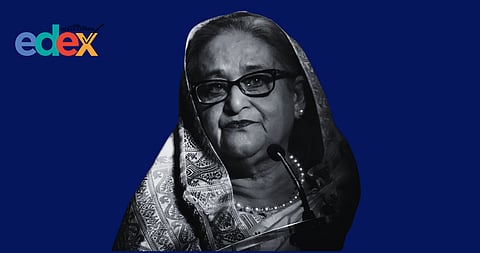

Bangladesh’s International Crimes Tribunal (ICT-BD) on Monday, November 17, sentenced deposed prime minister Sheikh Hasina to death after finding her guilty of alleged crimes against humanity committed during last year’s student-led agitation that led to the fall of her Awami League government, reported The New Indian Express.
The three-member tribunal also delivered its judgment against two of Hasina’s aides — former home minister Asaduzzaman Khan Kamal and former police chief Chowdhury Abdullah Al-Mamun — over the same charges. Al-Mamun was produced before the tribunal.
The former Bangladesh prime minister was found guilty of preventing justice, ordering the killing of protesters and failing to take measures to stop punitive killings. The tribunal, however, spared Al-Mamun from the death penalty after he became a state witness.
Key Tribunal observations on Hasina's directives
The chief judge of the (ICT-BD) observed that Hasina had ordered the use of helicopters, drones and lethal weapons against protesters, a directive revealed in her conversation with the mayor of South Dhaka Municipal Corporation. Forensic examination deemed the CD and recording genuine.
The tribunal also observed that Hasina had ordered the killing of protesting students, noting that records of her conversation with the Dhaka University VC were available.
The judge remarked that Hasina had undermined the student movement, noting that she had referred to Dhaka University students as “Razakar”, and that her remarks further enraged protesters.
He said that on the night following 14 July 2024, Hasina spoke to the university vice-chancellor and said, “I have hanged Razakars, they [protesters] will also be hanged. None of them will be spared,” adding, “I am ordering their arrest and action.”
The judge further stated that Hasina, the former home minister and the ex-police chief, had acted jointly to kill and suppress the protesters.
The tribunal also found that Hasina made hate speeches and, in a phone call with an aide named Shakeel, asked him to kill 226 people linked to cases filed against her.
Heightened security amid Awami League shutdown and violence
Prior to the verdict, the interim government had beefed up security in the nation’s capital and elsewhere on Monday. Paramilitary border guards and police were deployed in Dhaka and many other parts of the country as Hasina’s Awami League party called for a nationwide shutdown Monday to protest against the verdict, calling the tribunal a “kangaroo court.”
Hasina and Khan face charges of crimes against humanity for the killing of hundreds of people during a student-led uprising in July and August of 2024. The United Nations, in a February report, said up to 1,400 may have been killed in the violence, while the country’s health adviser under the interim government said more than 800 people were killed and about 14,000 were injured. Both of them are being tried in absentia.
The tribunal last week fixed Monday for delivering the verdict as reports of explosions of crude bombs and arson led to the disruption of classes and transportation across the country after the “lockdown” called for by Hasina’s party.
As the tribunal was set to convene Monday morning, the former ruling party called for the shutdown again, with Hasina in an audio message urging her supporters not to be “nervous” about the verdict. Hasina has survived at least 19 assassination attempts during her decades-long political career since 1981.
The verdict comes amid local media reports that new explosions of crude bombs in Dhaka, including one in front of the house of an adviser, equivalent to a Cabinet minister, on Sunday.
Meanwhile, Dhaka’s police chief Sheikh Mohammad Sazzat Ali issued a “shoot-on-sight” order if anyone attempts to torch vehicles or hurl crude bombs. The directive came as nearly 50 arson attacks, mostly targeting vehicles, and dozens of explosions of crude bombs have been reported nationwide over the past week. Two people were killed in the arson attacks, local media reported.
Authorities at the Supreme Court, in a letter to army headquarters on Sunday, requested the deployment of soldiers around the tribunal premises ahead of the verdict. The prosecution said the tribunal’s deliberation of the verdict could be broadcast live on the state-run Bangladesh Television and other TV stations channels.
Hasina was ousted on Aug. 5 last year and fled to India. Bangladeshi Nobel Peace Prize laureate Muhammad Yunus took over as the head of an interim government three days after her fall. Yunus vowed to punish Hasina and banned the activities of her Awami League party. Both Hasina and her party have called the special tribunal a “kangaroo court” and denounced the appointment of a lawyer by the state to represent her.
Yunus said his interim government would hold the next elections in February, and that Hasina’s party would not get a chance to contest the race. Bangladesh's politics under Yunus has remained at a crossroads with limited signs of stability.
